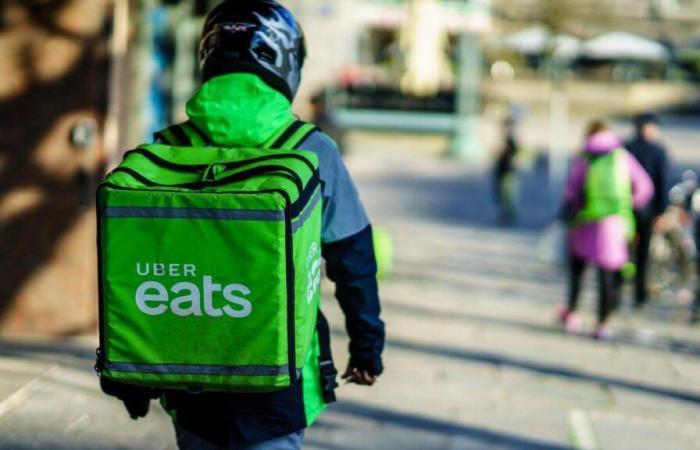For a decade, the stormy relationship between Uber Eats delivery drivers and their employer has regularly made the headlines in Belgian social and legal news. Should such workers be protected against deregulation knowing that they agreed at one point to evolve there? This was the question for a long time.
But last April, the Labor Relations Commission (CRT) estimated that the professional relationship which connects a courier to the American multinational must be “reclassified as an employee employment relationship”, and this from May 1. The role of this administrative commission is to determine whether a worker should be considered self-employed or an employee.
Uber Eats “in no way acquiesces” to employee status
This decision, which confers a series of rights to the worker (insurance, paid leave, minimum wage, etc.), was immediately challenged in court by the American multinational. She asked to suspend the application of the regime decreed by the Labor Relations Commission, explaining that years of legal debates would probably pass before the judgment on the merits was pronounced. But the French-speaking labor court in Brussels stood firm and instead demanded that Uber Eats immediately apply the CRT’s decision to three couriers who had appeared before the courts to assert their new rights.
No matter, Uber Eats opted for extreme measures: it fired the three couriers, telling them by letter that it is “immediately impossible for it to register its activity under the conditions provided for by the social law regulations”. The American multinational “in no way acquiesces” to employee status.
The limits of Belgian and European legislation
The American multinational’s response undermines the recent development of Belgian social law. In 2023, a new law was passed to make it easier for platform workers to obtain employee status. It is on this text that the Labor Relations and Justice Commission relied to grant Uber Eats couriers the status they requested.
This law provides that a presumption of employment exists as long as certain criteria are met. It reverses the burden of proof and strengthens the powers of the commission in charge of disputes.
At the beginning of this year, new European regulations quite similar to Belgian law came into force. It also aims to guarantee people working via platforms to have a correctly defined professional status. The text also regulates, for the first time in the EU, the use of algorithms in the workplace. It requires Member States to establish a rebuttable legal presumption of employment at national level, with the aim of correcting the power imbalance between the digital labor platform and the person carrying out professional activity through it. Here too, the burden of proof now falls on the platform.
But the fact remains that a boss is always entitled to dismiss a worker if he takes the steps required by law. In Belgium, when it comes to self-employed people, breaking up could not be simpler as a general rule. The three Uber Eats couriers having been recognized as employees, their dismissal risks on the contrary being seen as unfair before the court which could impose the payment of compensation to the plaintiffs. The equivalent of a few months’ salary, at most. “Peanuts” a priori for a multinational, the real issue residing in the jurisprudential nature or not of the decision that the courts will take.
An intimidation maneuver
“The fact remains that at the end of this procedure, it seems highly unlikely that other workers will embark on this adventure, at risk of losing their income,” writes the French-speaking daily The evening who discerns an intimidation maneuver. Uber Eats explains for its part that the refusal of suspension decided by the judge is only a preliminary phase and “does not constitute a decision on the qualification of the delivery people.
We await the opportunity to further clarify our position to the judge who will rule on the merits of the case at a later stage.” As for the office of the Minister of Economy and Labor (in current affairs), the socialist Pierre-Yves Dermagne, it brushes aside the multinational’s arguments: “It is therefore a very big step forward,” he asserts, “since social security institutions will be able to carry out what has been said. Just one example: the National Social Security Office (ONSS) will be able to claim contributions for wages owed.”
The dismissal of three Uber Eats couriers does not imply that the law is bad, its defenders still argue. They take as proof the fact that fifteen platforms are now systematically controlled in Belgium.
This affair is reminiscent of the regular clashes between Ryanair workers based at Charleroi airport and their boss, Michael O’Leary.
For the unions, successive strikes have made it possible to advance the social rights of Belgian workers at the low-cost airline, but the fight is far from over. The confrontation between national law and Ryanair’s practices which take advantage of gray areas in social legislation has highlighted the importance of European regulation and transnational union coordination. Ultimately, developments in this area will also depend on the political and legal pressure exerted to force companies that rely on deregulation to fully respect the laws of the countries where they operate.






